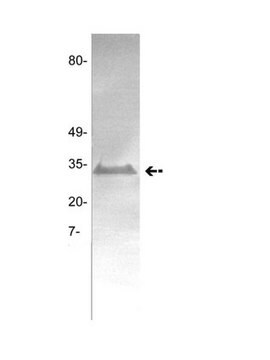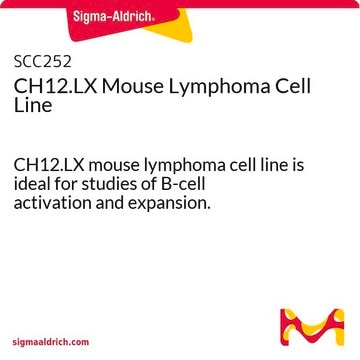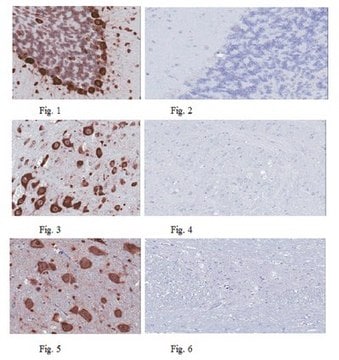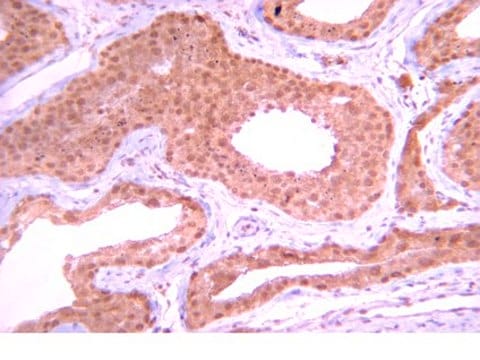Recommended Products
biological source
rabbit
Quality Level
antibody form
serum
antibody product type
primary antibodies
clone
polyclonal
species reactivity
hamster, mouse, rat, human
manufacturer/tradename
Upstate®
technique(s)
immunoprecipitation (IP): suitable
western blot: suitable
isotype
IgG
NCBI accession no.
UniProt accession no.
shipped in
dry ice
target post-translational modification
unmodified
Gene Information
human ... GNAI3(2773)
Specificity
Recognizes Giα3 and Goα; low cross-reactivity with other G-proteins.
Immunogen
peptide corresponding to the C-terminal region of Giα3 (KNNLKECGLY)
Application
Detect Giα3 using this Anti-Giα3 Antibody validated for use in IP & WB.
Research Category
Signaling
Signaling
Research Sub Category
GPCR, cAMP/cGMP & Calcium Signaling
GPCR, cAMP/cGMP & Calcium Signaling
Quality
routinely evaluated by immunoblot on rat hippocampus membrane preparation, solubilized rat and mouse brain membranes or mouse 3T3/A31 cell lysates
Target description
40 kDa
Physical form
Protein A Purified immunoglobulin in 30% glycerol, 0.07M Tris-glycine, pH 7.4, 0.105 M NaCl, 0.035% sodium azide as a preservative.
Unpurified
Storage and Stability
Maintain for 2 years at -20°C from date of shipment. Aliquot to avoid repeated freezing and thawing. For maximum recovery of product, centrifuge the original vial after thawing and prior to removing the cap.
Analysis Note
Control
Widely expressed
Widely expressed
Other Notes
Concentration: Please refer to the Certificate of Analysis for the lot-specific concentration.
Legal Information
UPSTATE is a registered trademark of Merck KGaA, Darmstadt, Germany
Disclaimer
Unless otherwise stated in our catalog or other company documentation accompanying the product(s), our products are intended for research use only and are not to be used for any other purpose, which includes but is not limited to, unauthorized commercial uses, in vitro diagnostic uses, ex vivo or in vivo therapeutic uses or any type of consumption or application to humans or animals.
Not finding the right product?
Try our Product Selector Tool.
Storage Class Code
10 - Combustible liquids
WGK
WGK 1
Certificates of Analysis (COA)
Search for Certificates of Analysis (COA) by entering the products Lot/Batch Number. Lot and Batch Numbers can be found on a product’s label following the words ‘Lot’ or ‘Batch’.
Already Own This Product?
Find documentation for the products that you have recently purchased in the Document Library.
Amarilla B Mandola et al.
The Journal of allergy and clinical immunology, 147(2), 727-733 (2020-09-28)
Genetic faults in several components of the nuclear factor-κB pathway cause immunodeficiency. Most defects lead to combined immunodeficiency with a range of severity. Heterozygous mutations in NFKB1 were associated with common variable immunodeficiency, however, homozygous mutations have not been described.
Nina Sopel et al.
Cells, 11(1) (2022-01-12)
Nephronectin (NPNT) is an extracellular matrix protein in the glomerular basement membrane that is produced by podocytes and is important for the integrity of the glomerular filtration barrier. Upregulated transforming growth factor β (TGF-β) and altered NPNT are seen in
G(o)-protein alpha-subunits activate mitogen-activated protein kinase via a novel protein kinase C-dependent mechanism.
van Biesen, T, et al.
The Journal of Biological Chemistry, 271, 1266-1269 (1996)
J M Sands et al.
The Journal of clinical investigation, 99(6), 1399-1405 (1997-03-15)
During antidiuresis, increases in vasopressin (AVP)-elicited osmotic water permeability in the terminal inner medullary collecting duct (tIMCD) raise luminal calcium concentrations to levels (> or = 5 mM) above those associated with the formation of calcium-containing precipitates in the urine.
Disulfide bonds in the extracellular calcium-polyvalent cation-sensing receptor correlate with dimer formation and its response to divalent cations in vitro
Ward, D. T., et al
The Journal of Biological Chemistry, 273, 14476-14483 (1998)
Our team of scientists has experience in all areas of research including Life Science, Material Science, Chemical Synthesis, Chromatography, Analytical and many others.
Contact Technical Service








